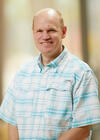In The News: Department of Physics and Astronomy
Molecules containing noble gases shouldn’t exist. By definition, these chemical elements — helium, neon, argon, krypton, xenon and radon — are the party poopers of the periodic table, huddling in the rightmost column and refusing to make molecules. Indeed, no one has ever seen any naturally occurring noble gas molecules on Earth. Earlier this decade, though, astronomers accidentally discovered one of these aloof elements in molecules in space.

Improving the airplane boarding experience has become something of a holy grail over the years, especially after a 1998 Boeing study suggested that airlines could increase profits by decreasing airplane turnaround time. Since then, airlines have invested significant time and money into seeing if they can speed up one of the most frustrating parts of air travel—and that’s saying a lot, considering the other frustrating elements of flying.
There is no question that carbon dioxide levels are rising to unprecedented levels, at least compared to the prior 800,000 years.
Boarding is one of the more stressful parts of a plane journey. The current ways most airlines board their planes leave a lot to be desired when it comes to efficiency. But there are some options which could make the whole process a lot easier.
On the night of January 14, 2019, astronomer Razmik Mirzoyan got a call at his home in Germany.
Gamma-ray bursts are the most powerful explosions in the known universe, thought to be released when a massive star collapses into a black hole or neutron star.
American astrophysicist and associate professor of physics and astronomy at the University of Nevada, Las Vegas Jason Steffen joins Matt Bubala to address the true meaning of a black hole. Jason is known for his work on the discoveries of several exoplanets. Matt and Jason go in depth of the true definition of a black hole and give insight on what really happens to you if you were to enter.

A professor at UNLV is presenting data obtained from a NASA space mission in the form of music.

Outer space might be silent, but if planets could sing their tunes could tell us a lot about how they formed. At least that’s the theory of UNLV researcher and astrophysicist Jason Steffen, who turned data on thousands of distant worlds into chord progressions that may indicate how they have changed since their births.
In 1619, German astronomer Johannes Kepler published his Harmonices Mundi (Harmony of the World), a text that investigated how mathematics could help the planets of the solar system create celestial music based on their orbital resonances.
We might need to rethink our understanding of water, both on Earth and other planets. New experiments with water ice at high pressures has revealed unexpected behaviour, which could upend our assumptions about the makeup of icy exoplanets.
We might need to rethink our understanding of water, both on Earth and other planets. New experiments with water ice at high pressures has revealed unexpected behaviour, which could upend our assumptions about the makeup of icy exoplanets.

